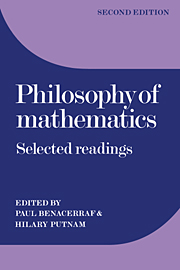Book contents
- Frontmatter
- Contents
- Preface to the second edition
- Introduction
- Part I The foundations of mathematics
- Symposium on the foundations of mathematics
- Disputation
- Intuitionism and formalism
- Consciousness, philosophy, and mathematics
- The philosophical basis of intuitionistic logic
- The concept of number
- Selections from Introduction to Mathematical Philosophy
- On the infinite
- Remarks on the definition and nature of mathematics
- Hilbert's programme
- Part II The existence of mathematical objects
- Part III Mathematical truth
- Part IV The concept of set
- Bibliography
The concept of number
Published online by Cambridge University Press: 05 June 2012
- Frontmatter
- Contents
- Preface to the second edition
- Introduction
- Part I The foundations of mathematics
- Symposium on the foundations of mathematics
- Disputation
- Intuitionism and formalism
- Consciousness, philosophy, and mathematics
- The philosophical basis of intuitionistic logic
- The concept of number
- Selections from Introduction to Mathematical Philosophy
- On the infinite
- Remarks on the definition and nature of mathematics
- Hilbert's programme
- Part II The existence of mathematical objects
- Part III Mathematical truth
- Part IV The concept of set
- Bibliography
Summary
Each individual number is an independent object
55. Having recognized that a statement of number is an assertion about a concept, we can attempt to supplement the leibnizian definitions of the individual numbers by means of the definitions of 0 and of 1.
Right away we might say: the number 0 applies to a concept, if no object falls under that concept. Here, however, “no” appears to have been substituted for 0, with which it is synonymous. Therefore the following wording is preferable: the number 0 applies to a concept if, no matter what a might be, the statement always holds that a does not fall under this concept.
Similarly we could say: the number 1 applies to a concept F if it is not the case that no matter what a is, a does not fall under F, and if from the statement
‘a falls under F’ and ‘b falls under F’
it always follows that a and b are the same.
We must still define in general the transition from one number to the next. We will try the following formulation: the number (n + 1) applies to the concept F if there is an object a which falls under F and such that the number n applies to the concept “falling under F but not [identical with] a”.
56. These definitions appear so natural, following our previous results, that an explanation is called for to show why they cannot satisfy us.
- Type
- Chapter
- Information
- Philosophy of MathematicsSelected Readings, pp. 130 - 159Publisher: Cambridge University PressPrint publication year: 1984
- 4
- Cited by



